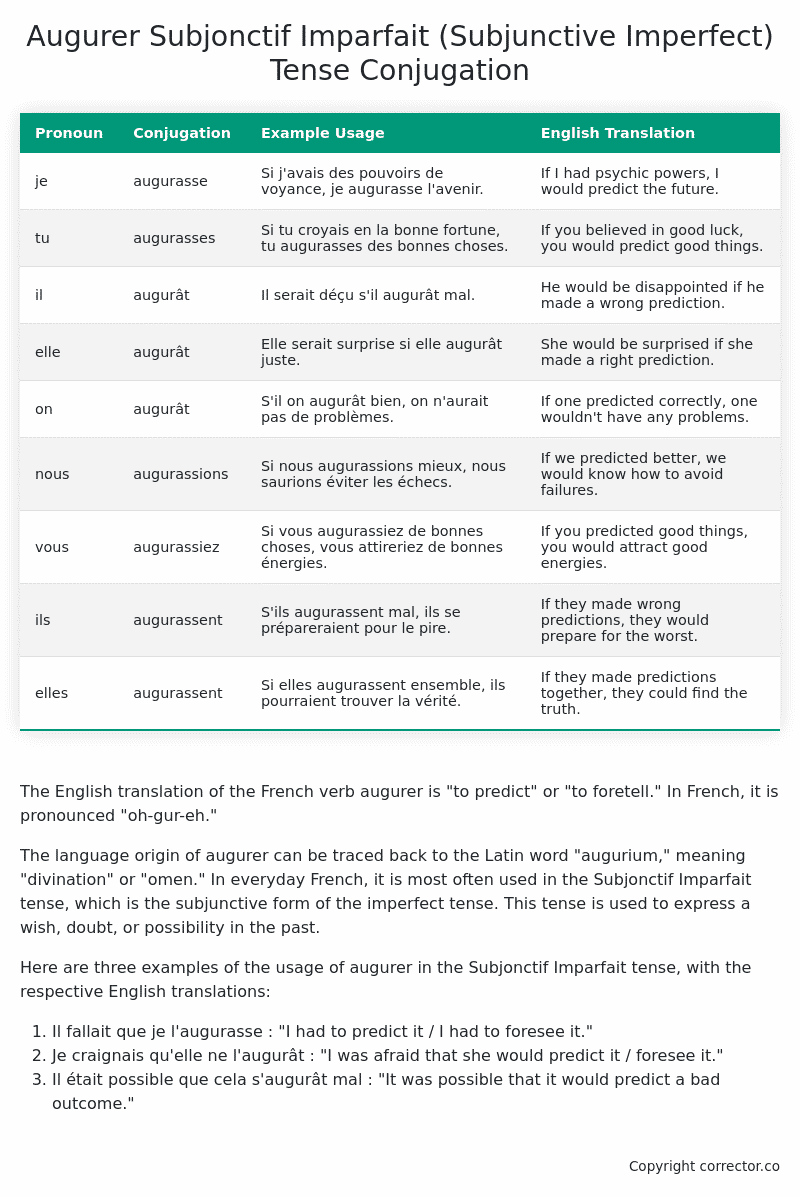Subjonctif Imparfait (Subjunctive Imperfect) Tense Conjugation of the French Verb augurer
Introduction to the verb augurer
The English translation of the French verb augurer is “to predict” or “to foretell.” In French, it is pronounced “oh-gur-eh.”
The language origin of augurer can be traced back to the Latin word “augurium,” meaning “divination” or “omen.” In everyday French, it is most often used in the Subjonctif Imparfait tense, which is the subjunctive form of the imperfect tense. This tense is used to express a wish, doubt, or possibility in the past.
Here are three examples of the usage of augurer in the Subjonctif Imparfait tense, with the respective English translations:
- Il fallait que je l’augurasse : “I had to predict it / I had to foresee it.”
- Je craignais qu’elle ne l’augurât : “I was afraid that she would predict it / foresee it.”
- Il était possible que cela s’augurât mal : “It was possible that it would predict a bad outcome.”
Table of the Subjonctif Imparfait (Subjunctive Imperfect) Tense Conjugation of augurer
| Pronoun | Conjugation | Example Usage | English Translation |
|---|---|---|---|
| je | augurasse | Si j’avais des pouvoirs de voyance, je augurasse l’avenir. | If I had psychic powers, I would predict the future. |
| tu | augurasses | Si tu croyais en la bonne fortune, tu augurasses des bonnes choses. | If you believed in good luck, you would predict good things. |
| il | augurât | Il serait déçu s’il augurât mal. | He would be disappointed if he made a wrong prediction. |
| elle | augurât | Elle serait surprise si elle augurât juste. | She would be surprised if she made a right prediction. |
| on | augurât | S’il on augurât bien, on n’aurait pas de problèmes. | If one predicted correctly, one wouldn’t have any problems. |
| nous | augurassions | Si nous augurassions mieux, nous saurions éviter les échecs. | If we predicted better, we would know how to avoid failures. |
| vous | augurassiez | Si vous augurassiez de bonnes choses, vous attireriez de bonnes énergies. | If you predicted good things, you would attract good energies. |
| ils | augurassent | S’ils augurassent mal, ils se prépareraient pour le pire. | If they made wrong predictions, they would prepare for the worst. |
| elles | augurassent | Si elles augurassent ensemble, ils pourraient trouver la vérité. | If they made predictions together, they could find the truth. |
Other Conjugations for Augurer.
Le Present (Present Tense) Conjugation of the French Verb augurer
Imparfait (Imperfect) Tense Conjugation of the French Verb augurer
Passé Simple (Simple Past) Tense Conjugation of the French Verb augurer
Passé Composé (Present Perfect) Tense Conjugation of the French Verb augurer
Futur Simple (Simple Future) Tense Conjugation of the French Verb augurer
Futur Proche (Near Future) Tense Conjugation of the French Verb augurer
Plus-que-parfait (Pluperfect) Tense Conjugation of the French Verb augurer
Passé Antérieur (Past Anterior) Tense Conjugation of the French Verb augurer
Futur Antérieur (Future Anterior) Tense Conjugation of the French Verb augurer
Subjonctif Présent (Subjunctive Present) Tense Conjugation of the French Verb augurer
Subjonctif Passé (Subjunctive Past) Tense Conjugation of the French Verb augurer
Subjonctif Imparfait (Subjunctive Imperfect) Tense Conjugation of the French Verb augurer (this article)
Subjonctif Plus-que-parfait (Subjunctive Pluperfect) Tense Conjugation of the French Verb augurer
Conditionnel Présent (Conditional Present) Tense Conjugation of the French Verb augurer
Conditionnel Passé (Conditional Past) Tense Conjugation of the French Verb augurer
L’impératif Présent (Imperative Present) Tense Conjugation of the French Verb augurer
L’infinitif Présent (Infinitive Present) Tense Conjugation of the French Verb augurer
Struggling with French verbs or the language in general? Why not use our free French Grammar Checker – no registration required!
Get a FREE Download Study Sheet of this Conjugation 🔥
Simply right click the image below, click “save image” and get your free reference for the augurer Subjonctif Imparfait tense conjugation!

Augurer – About the French Subjonctif Imparfait (Subjunctive Imperfect) Tense
Formation
Common Everyday Usage Patterns
Interactions with Other Tenses
Subjonctif Présent
Indicatif Passé Composé
Conditional
Conditional Perfect
Summary
I hope you enjoyed this article on the verb augurer. Still in a learning mood? Check out another TOTALLY random French verb conjugation!


